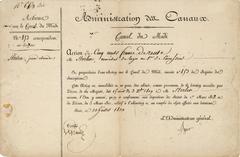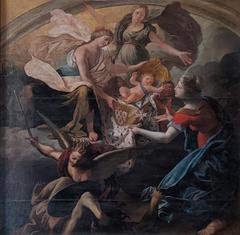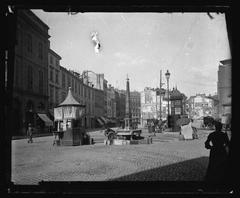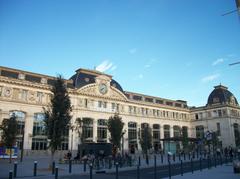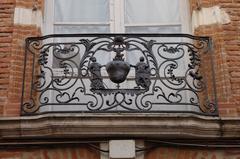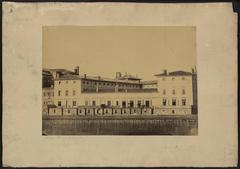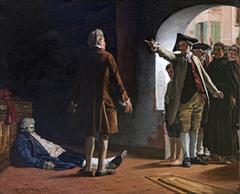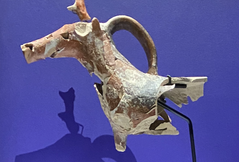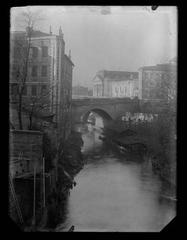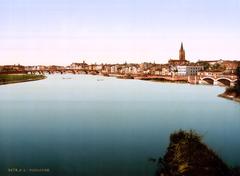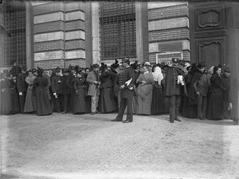Hôtel Dassier Toulouse Visiting Hours, Tickets, and Travel Guide
Date: 14/06/2025
Introduction
Hôtel Dassier, located at 46 rue des Couteliers in the vibrant heart of Toulouse, is an outstanding example of the city’s rich architectural and cultural history. This guide provides a comprehensive overview for visitors and architecture enthusiasts, detailing Hôtel Dassier’s historical background, architectural significance, visitor information, and its place among Toulouse’s celebrated collection of hôtels particuliers.
Why Visit Hôtel Dassier?
Hôtel Dassier is a rare architectural gem that reflects the evolution of French aristocratic residences from the Renaissance through the 18th century. Its distinctive red brick façade, elegant stone details, and the remarkable wrought-iron staircase crafted by Joseph Bosc have earned it classification as a historic monument (Le Décodé, Monumentum, France-Voyage). Although it remains a private residence and is not regularly open to the public, Hôtel Dassier participates in special heritage events, offering rare interior access to visitors.
Historical Background
Toulouse’s Hôtel Particulier Tradition
The hôtel particulier emerged in Toulouse’s late Middle Ages, flourishing as the city prospered from the pastel (woad) trade. These mansions combined private luxury with public display, serving as both homes and status symbols for the city’s elite (Le Décodé).
Hôtel Dassier, constructed in the early 18th century, epitomizes this tradition. Built for Jean-François de Tournier, comte de Vaillac, and later associated with Pierre Dassier, the mansion’s design reflects Toulouse’s transition from a medieval to a refined urban landscape (The Good Life France, France Today).
Architectural Features
Exterior and Façade
- Materials: Distinctive red brick, highlighted with stone window frames and cornices, create the signature “Pink City” appearance (The Good Life France).
- Design: The street-facing façade is harmonious yet restrained, with elements such as round-arched windows, pilasters with Ionic and Corinthian capitals, and terracotta medallions.
- Portal: The monumental entrance, with alternating brick and stone, is a surviving feature from the original 18th-century construction.
Courtyard and Layout
- Central Courtyard: A defining feature, providing light, air, and privacy while showcasing decorative pilasters, sculpted masks, and ornate window surrounds.
- Spatial Organization: The interior is arranged for both comfort and display, with reception areas, private apartments, and service spaces reflecting 18th-century ideals.
The Joseph Bosc Staircase
- Artistic Highlight: The four-flight wrought-iron staircase, crafted in 1778 by Joseph Bosc, is a masterpiece of Toulouse ironwork. Its openwork oval motifs, laurel flames, quivers, torches, garlands, and oak wreaths exemplify both Rococo exuberance and Neoclassical clarity (Monumentum).
- Heritage Status: The staircase has been protected as a historic monument since 1927.
Cultural and Social Significance
Hôtel Dassier is an emblem of Toulouse’s aristocratic urban life and economic boom during the pastel trade era. Its construction and preservation highlight the influence and aspirations of the city’s elite, while its continued protection reflects Toulouse’s commitment to heritage conservation (Le Décodé).
Visitor Information
Location
- Address: 46 rue des Couteliers, 31000 Toulouse
- GPS: 43° 35’57.81”N, 1° 26’29.89”E (Guide Toulouse Pyrénées)
- Access: Centrally located, within walking distance of major landmarks such as Place du Capitole, Pont Neuf, Hôtel d’Assézat, and Église Notre-Dame de la Daurade.
Visiting Hours and Tickets
- Regular Access: Hôtel Dassier is a private residence and not regularly open for public visits.
- Special Events: Interior access is typically available during heritage events such as the European Heritage Days (Journées du Patrimoine), usually in September. During these times, guided tours may be offered—check with the Toulouse Tourism website for the latest updates.
- Tickets: No tickets are required to admire the exterior. Guided tours or event access may require reservations or a small fee.
Accessibility
- The exterior and surrounding streets are accessible for most visitors, though interiors may be challenging for those with limited mobility due to the historical structure. Confirm accessibility details with event organizers if planning to attend a special tour.
Guided Tours
- Hôtel Dassier is often featured on Renaissance-themed walking tours organized by the Toulouse Tourist Office. These tours provide insights into the history and architecture of the city’s hôtels particuliers (France Today).
Nearby Attractions
- Hôtel d’Assézat: Renowned for its Renaissance architecture and the Fondation Bemberg art collection.
- Hôtel de Bernuy: Known for its grand courtyard and historical significance.
- Musée du Vieux Toulouse: Offers a deep dive into the city’s heritage.
- Place du Capitole: The lively central square surrounded by monumental buildings.
- Pont Neuf: Toulouse’s iconic 16th-century bridge.
- Église Notre-Dame de la Daurade: A basilica with an artistic and spiritual legacy.
All sites are within a short walk of Hôtel Dassier, ideal for a comprehensive exploration of Toulouse’s historic core (Guide Toulouse Pyrénées, France-Voyage).
Visitor Tips
- Best Times to Visit: Spring (April–June) and early autumn (September–October) offer pleasant weather and coincide with cultural events.
- Photography: The exterior façade and courtyard can be photographed from public spaces. Respect private property and guests’ privacy.
- Languages: Tours are usually offered in French, with English options available during peak tourist seasons.
- Accessibility: Historic streets are mostly pedestrian-friendly, but cobblestones may pose difficulties for some visitors.
- Dining and Accommodation: The surrounding area offers a wide selection of restaurants and hotels, ideal for enjoying Toulouse’s gastronomy and ambiance (France-Voyage).
Visual Highlights
The austere yet elegant street façade of Hôtel Dassier, showcasing Toulouse’s signature red brick.
The exquisite 18th-century wrought-iron staircase railing by Joseph Bosc, a protected historic monument.
Frequently Asked Questions (FAQ)
Can I visit Hôtel Dassier’s interior?
No, except during special heritage events such as the European Heritage Days, when guided tours may be available.
Is there a ticket required to see Hôtel Dassier?
No ticket is needed to view the exterior. Guided tours or special event access may require advance reservation or a small fee.
Are guided tours available in English?
Yes, especially during peak tourist seasons. Check with the Toulouse Tourist Office for current offerings.
Is Hôtel Dassier wheelchair accessible?
The exterior is accessible, but interior access may be limited due to stairs and historical design.
How do I reach Hôtel Dassier?
It is centrally located in Toulouse’s historic center, easily accessible by foot, bicycle, or public transport.
Preservation and Heritage Status
Hôtel Dassier’s designation as a Monument Historique ensures its ongoing protection and careful restoration. The 2010 restoration respected historical integrity, maintaining signature features such as Joseph Bosc’s staircase and the original façade (France-Voyage). Its inclusion in guided tours highlights its educational and cultural value within Toulouse’s urban landscape.
Summary Table: Key Features of Hôtel Dassier
| Feature | Description | Period |
|---|---|---|
| Building Material | Red brick with stone accents | 16th–18th c. |
| Layout | Central courtyard plan | 18th c. |
| Staircase | Wrought-iron masterpiece by Joseph Bosc | 18th c. |
| Façade | Harmonious red brick, stone, terracotta medallions | 18th c. |
| Portal | Alternating brick and stone, monumental proportions | 18th c. |
| Heritage Status | Monument Historique, protected features | Since 1927 |
Enhance Your Visit with Audiala
For an enriched experience, download the Audiala app. The app features guided audio tours, interactive maps, and up-to-date event notifications for Hôtel Dassier and other Toulouse landmarks. Follow our social media channels for the latest travel tips and cultural insights.
References and Further Reading
- Le Décodé
- Monumentum
- The Good Life France
- France Today
- L’Opinion Indépendante
- Toulouse Tourism
- Guide Toulouse Pyrénées
- France-Voyage

